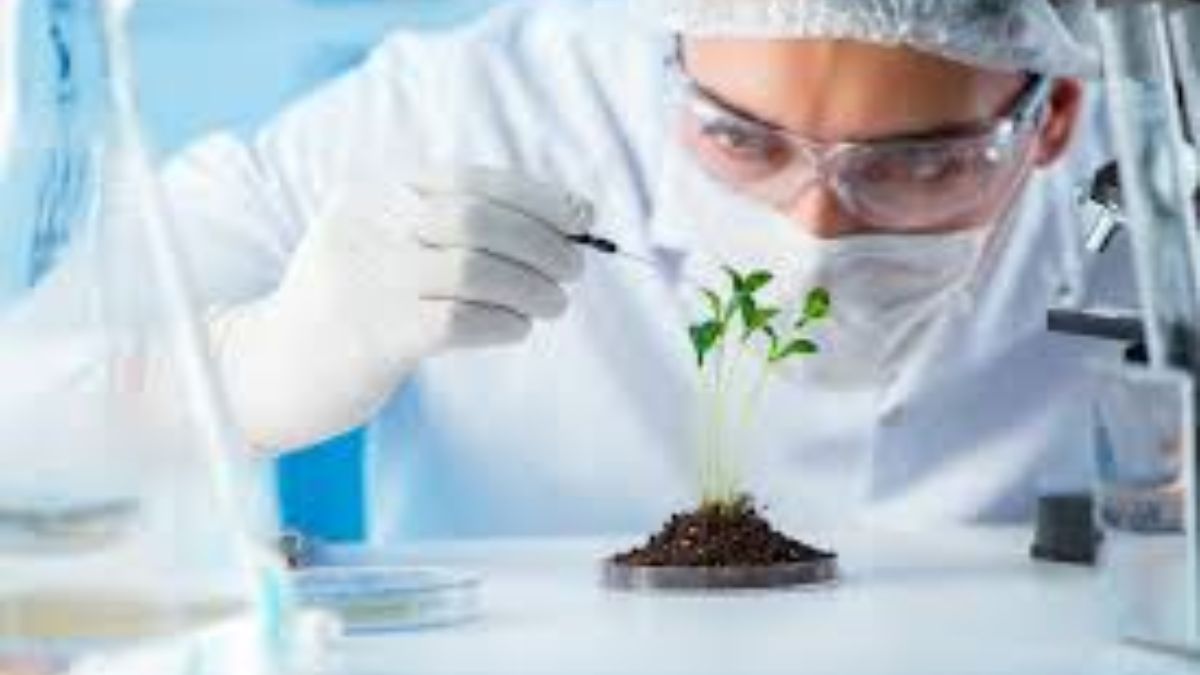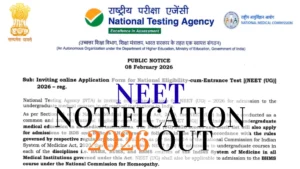The NEET Exam is a national level medical entrance exam conducted annually by the National Testing Agency as the process for selecting students for admission into top medical institutions like AIIMS, JIPMER, etc. To score higher in this exam, students need to visit the official website of NTA to access the NEET Syllabus 2026 and learn all the important topics mentioned there.
The NEET Biology Syllabus 2026 holds Biotechnology as one of the crucial topics to be studied and learned by all the students. Therefore, in this article, we have shared the NEET Notes for the Biotechnology chapter along with the direct link to download the PDF.
Biotechnology
Biotechnology uses living organisms, cells, or their derivatives to develop products and processes for human benefit, encompassing both traditional methods like fermentation (bread, wine) and modern genetic engineering techniques to create genetically modified organisms (GMOs). It’s a multidisciplinary field vital for healthcare (new drugs, vaccines), agriculture (high-yield crops), industry (enzymes), and environmental protection (waste management, biofuels).
Principles of Biotechnology
The principles of biotechnology are based on two core techniques: genetic engineering and bioprocess engineering. Genetic engineering involves altering an organism’s genetic material to change its traits, while bioprocess engineering focuses on maintaining sterile conditions to grow organisms on a large scale for producing useful products like antibiotics, vaccines, and enzymes.
- Genetic Engineering
- Involves direct manipulation of DNA to alter the genetic makeup of an organism.
- Enables the transfer of genes between different organisms (recombinant DNA technology).
- Example: Insertion of the human insulin gene into bacteria to produce insulin.
- Maintenance of Sterile Conditions
- Essential for growing desired microorganisms or cells without contamination.
- Used during processes like fermentation and tissue culture.
Core Techniques in Biotechnology
“Core Techniques in Biotechnology” covers the foundational methods used in modern biotechnology, including genetic engineering and maintaining sterile environments to prevent contamination. Other key areas involve recombinant DNA technology, DNA sequencing, cloning, protein engineering, and fermentation. These techniques are applied in various fields, such as medicine, agriculture, and environmental science.
- Recombinant DNA Technology
- DNA from two different sources is combined to form a new genetic sequence.
- Steps include isolation of DNA, cutting with restriction enzymes, joining fragments with ligase, and introducing recombinant DNA into host cells.
- Polymerase Chain Reaction (PCR)
- A technique used to amplify specific DNA sequences.
- It enables scientists to produce millions of copies of a DNA fragment in a short time.
- Gene Cloning
- The process of producing identical copies of a gene or DNA sequence.
- Used for studying gene functions or producing therapeutic proteins.
- Tissue Culture
- Growing plant or animal cells in an artificial medium under controlled conditions.
- Used for micropropagation and the production of disease-free plants.
- Genetic Engineering Vectors
- Vehicles used to transfer genes into host cells (e.g., plasmids, bacteriophages).
Applications of Biotechnology
Biotechnology has wide-ranging applications in healthcare, agriculture, and industry, including producing pharmaceuticals like insulin and vaccines, creating genetically modified crops for pest resistance and enhanced nutrition, and developing biofuels and bioremediation for environmental cleanup. It uses living organisms and technology to create products and solutions that improve human life and address global challenges.
1. Agriculture
- Development of Genetically Modified Crops (GMOs) with improved yield, pest resistance, and drought tolerance.
- Example: Bt cotton, which produces its own insecticide.
- Use of biofertilizers and biopesticides to reduce chemical dependency.
2. Medicine
- Production of insulin, vaccines, antibiotics, and monoclonal antibodies.
- Gene therapy for correcting defective genes.
- Stem cell therapy for regenerating damaged tissues.
- Development of personalized medicines based on genetic profiles.
3. Industry
- Use of enzymes in food processing, textile, and paper industries.
- Biodegradable plastics and biofuels for sustainable development.
4. Environment
- Bioremediation – using microorganisms to clean up pollutants like oil spills and heavy metals.
- Waste management through microbial degradation.
- Bioindicator species to monitor environmental health.
5. Forensic Science
-
DNA fingerprinting is used in criminal investigations, paternity testing, and the identification of remains.
Ethical, Legal, and Social Issues in Biotechnology
While biotechnology offers enormous benefits, it also raises concerns such as:
- Genetic privacy and misuse of genetic data.
- Ethical debates over cloning and gene editing (e.g., CRISPR-Cas9).
- Environmental risks of GMOs affecting biodiversity.
- Intellectual property rights related to genetic resources.
To manage these, guidelines like Biosafety Rules (1989) and organizations like GEAC (Genetic Engineering Appraisal Committee) regulate biotechnology use in India.
Biotechnology in India
India has made significant progress in biotechnology with several government initiatives such as:
- Department of Biotechnology (DBT) under the Ministry of Science and Technology.
- Biotechnology Industry Research Assistance Council (BIRAC) promoting startups.
- Growth of biopharma, bioinformatics, and agri-biotech sectors.
Prominent research institutes include:
- National Centre for Biotechnology Information (NCBI)
- Centre for Cellular and Molecular Biology (CCMB)
- National Institute of Immunology (NII)
Future Prospects of Biotechnology
Biotechnology’s future is characterized by rapid innovation, driven by cutting-edge technologies like gene editing, synthetic biology, and artificial intelligence (AI). These advances are addressing some of the world’s most pressing challenges, including food security, climate change, and human health. However, this progress also presents complex ethical and regulatory questions that require careful management. The future of biotechnology holds immense potential with innovations in:
- CRISPR gene editing for precise genetic modifications.
- Synthetic biology for designing artificial organisms.
- Nanobiotechnology for drug delivery and diagnostics.
- Bioinformatics for genome analysis and disease prediction.
- Regenerative medicine using 3D bioprinting and stem cells.
These advancements aim to create sustainable, health-focused, and eco-friendly solutions for humanity.
Importance of Biotechnology NEET Notes
Preparing for the NEET Exam using notes is a very important factor for the students as it helps them understand and learn in-depth about the exam and relatd factors. Some of the factors explaining the importance of NEET Notes for the Biotechnology chapter are detailed below:
- Simplifies Complex Concepts: NEET notes break down difficult biotechnological processes like recombinant DNA and PCR into easy-to-understand points, making learning faster and clearer.
- Quick Revision Tool: Concise notes help students revise the entire biotechnology syllabus efficiently before the exam, saving time and boosting confidence.
- Focus on Key Topics: Well-prepared notes highlight important NEET topics such as genetic engineering, applications, and enzymes involved, ensuring you study what truly matters.
- Improves Conceptual Clarity: Notes explain principles, techniques, and applications in a structured way, enhancing conceptual understanding and retention.
- Includes Important Diagrams: Visual aids like gene cloning and PCR diagrams make it easier to grasp and remember complex mechanisms effectively.
- Boosts Scoring Potential: By covering frequently asked questions and terms, NEET notes help students answer MCQs accurately and score higher marks.
- Time-Saving During Preparation: Instead of going through bulky textbooks, students can rely on summarized notes for last-minute revisions.
- Enhances Long-Term Retention: Well-organized biotechnology notes help retain information for both NEET and future biology studies, including medical college preparation.
NEET Important Questions – Biotechnology
Question 1. Who coined the term “Biotechnology”?
a) Stanley Cohen
b) Karl Ereky
c) Paul Berg
d) Watson and Crick
Answer: b) Karl Ereky
Question 2. Which enzyme is used to join DNA fragments in recombinant DNA technology?
a) Restriction enzyme
b) DNA polymerase
c) DNA ligase
d) RNA polymerase
Answer: c) DNA ligase
Question 3. Bt cotton is genetically modified for:
a) Drought resistance
b) Pest resistance
c) Increased yield
d) Disease resistance
Answer: b) Pest resistance
Question 4. The process of making multiple copies of a gene is known as:
a) Gene transfer
b) Gene cloning
c) Gene mutation
d) Gene therapy
Answer: b) Gene cloning
Question 5. Which of the following is a vector used in genetic engineering?
a) Ribosome
b) Plasmid
c) Nucleus
d) Lysosome
Answer: b) Plasmid
Question 6. PCR is used for:
a) DNA amplification
b) DNA sequencing
c) Protein synthesis
d) Cell division
Answer: a) DNA amplification
Question 7. Which of the following is an example of bioremediation?
a) Bt cotton
b) Oil-eating bacteria
c) Insulin production
d) Monoclonal antibody
Answer: b) Oil-eating bacteria
Question 8. What is recombinant DNA technology?
Ans. Recombinant DNA technology involves combining DNA from two different organisms to produce new genetic combinations that are of value in medicine, agriculture, or industry.
Question 9. Define genetic engineering.
Ans. Genetic engineering is the deliberate modification of an organism’s genetic material to achieve desired traits.
Question 10. Name two important applications of biotechnology in medicine.
- Production of insulin
- Gene therapy for treating genetic disorders
Question 11. What are transgenic organisms?
Ans. Organisms that contain and express foreign genes introduced through genetic engineering are called transgenic organisms.
Question 12. What is bioremediation?
Ans. The process of using microorganisms to clean up environmental pollutants is called bioremediation.









 NTA NEET 2026 Notification OUT at neet.n...
NTA NEET 2026 Notification OUT at neet.n...
 NEET Preparation Strategy 2026: Detailed...
NEET Preparation Strategy 2026: Detailed...
 Free NEET Sample Papers 2026 PDF | Downl...
Free NEET Sample Papers 2026 PDF | Downl...









